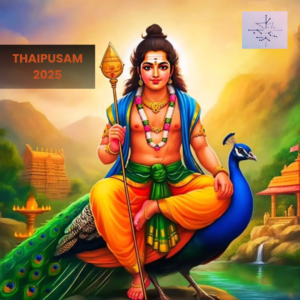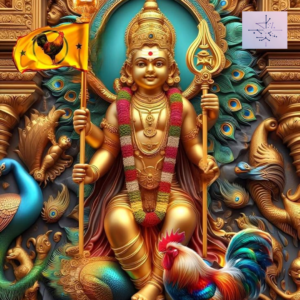Introduction to Thaipusam
Thaipusam, an important festival in the Hindu calendar, is celebrated primarily by the Tamil community around the world, including countries such as India, Malaysia, and Singapore. This festival falls on the full moon day in the month of Thai, which usually corresponds to January or February. The significance of Thaipusam lies in its deep spiritual connection to the worship of Lord Murugan, the son of Lord Shiva and Goddess Parvati, who is revered as the deity of war, victory, and wisdom.

The origins of Thaipusam can be traced back to ancient Hindu texts, which recount the story of Lord Murugan’s victory over the demon Soorapadman. Devotees commemorate this moment as a demonstration of the triumph of good over evil, embodying the ideals of devotion and penance. The festival serves as a time for contemplation, reflection, and physical expression of faith among practitioners. Devotees often engage in acts of devotion, such as carrying kavadis—ornate structures adorned with flowers and peacock feathers—through elaborate processions to express their gratitude and seek blessings from Lord Murugan.
Communities that observe Thaipusam actively participate in rituals that connect them to their cultural heritage. This celebration is particularly vibrant in Malaysia, where it has evolved into a significant public event, attracting thousands of participants and spectators alike. This festive occasion not only strengthens communal ties but also encourages individuals to deepen their spiritual connection with Lord Murugan. As devotees prepare for Thaipusam 2025, they engage in practices that involve fasting, prayer, and various forms of physical endurance, exemplifying their unwavering commitment to their faith. The upcoming celebrations promise an opportunity for renewal and devotion, reinforcing the festival’s timeless appeal and significance within the Hindu tradition.
Understanding Lord Murugan
Lord Murugan, revered as a significant deity in Hindu mythology, holds a central position during the Thaipusam festival in 2025. He is often depicted as the God of War, a protector, and a guide, symbolizing the triumph of good over evil. Traditionally, he is represented with six faces and twelve arms, each aspect embodying different attributes that resonate deeply with his followers. His fierce yet benevolent nature signifies strength and agility, making him a formidable force in mythology.
In Hindu scriptures, Lord Murugan is known for vanquishing the demon Tarakasura, with his divine lance, Vel, representing the power of righteousness. As a guardian deity, he embodies the ideals of courage, loyalty, and strategic warfare, serving as a protector for devotees. His attributes extend beyond mere physical prowess; he is also associated with wisdom and compassion, guiding devotees through life’s challenges. This duality enhances his appeal among worshippers, who view him not only as a divine warrior but also as a compassionate protector.
Lord Murugan’s significance is especially prominent in Tamil culture, where he is also referred to as Kartikeya or Skanda. His festivals, particularly Thaipusam, are celebrated with much fervor within Tamil communities, reflecting deep devotion and cultural pride. These celebrations include vibrant processions, music, and elaborate rituals that include offerings and penance to express gratitude and seek blessings. The connection between Lord Murugan and Tamil identity is profound; he serves as a cultural symbol that fosters unity and shared values among the Tamil people. Such devotion is a testament to his enduring legacy, as adherents prepare for Thaipusam 2025 with unwavering faith in their beloved deity.
Overview of Thaipusam Rituals
Thaipusam is a festival celebrated predominantly by Tamil communities in honor of Lord Murugan, the deity representing victory, power, and divine grace. The festival is marked by a series of rituals that serve as expressions of devotion and penance, reflecting the deep faith of participants. One of the most notable rituals associated with Thaipusam is the kavadi, a ceremonial offering that devotees carry as a manifestation of their devotion to Lord Murugan.
The kavadi is a decorated frame, often adorned with flowers, peacock feathers, and representations of the deity, which devotees carry during their pilgrimage to a temple. This act of carrying the kavadi symbolizes the burden of sins that the devotees seek to unload, along with a demonstration of their commitment to Lord Murugan. The act of carrying kavadis can range from the relatively simple to elaborate displays involving intricate and heavy constructions, reflecting individual levels of devotion and spiritual significance.
Moreover, many devotees engage in the piercing of the body, a practice that has profound symbolic meaning. This ritual might involve the insertion of hooks, skewers, or even small lances into various parts of the body. It is a form of self-mortification that embodies the belief in overcoming physical pain through spiritual enlightenment and devotion to Lord Murugan. By enduring such acts, participants aim to seek forgiveness, fulfill vows, or express gratitude for blessings received. Additionally, other forms of penance may include fasting, singing devotional songs, and engaging in prayers, further demonstrating the profound spiritual connection that characterizes Thaipusam rituals.
The various rituals observed during Thaipusam serve to reinforce the cultural and religious elements of the festival. They evoke a spirit of community, unity, and shared faith, allowing devotees to express their unwavering dedication to Lord Murugan in a profound and public manner. This festival stands as a significant event, showcasing the rich tapestry of Tamil traditions and the enduring devotion to the divine.
Significance of Kavadi Attam
Kavadi Attam is a profoundly significant ritual observed during the Thaipusam festival, primarily dedicated to Lord Murugan. This dance of devotion involves devotees carrying ornate kavadis, which are symbolic structures that represent their commitment, penance, and spiritual journey. For devotees, participating in Kavadi Attam is a way to express gratitude to Lord Murugan for blessings received or to seek his divine intervention for various challenges in life.
The preparation for carrying a kavadi is an extensive process that requires mental and physical discipline. Devotees may spend weeks or even months in preparation, which includes dietary restrictions, abstaining from alcohol, and engaging in prayer and meditation. This preparation is crucial as it helps devotees purify their minds and bodies, emphasizing the gravity of their undertaking. The act of carrying a kavadi is not merely about physical strength; it reflects a deep emotional and spiritual commitment and serves as a medium for personal transformation.
The intricate designs of kavadis are often adorned with flowers, peacock feathers, and other decorations, which contribute to the visual spectacle of the Thaipusam celebration. As devotees perform Kavadi Attam, they often enter a trance-like state, believing they are channeling the power of Lord Murugan. This experience allows for an emotional release and spiritual rejuvenation, bridging the connection between the devotees and the divine. The rhythmic movements of the dance embody their surrender and devotion, allowing for a moment of transcendence.
In conclusion, Kavadi Attam offers a deep insight into the emotional and spiritual dimensions of the Thaipusam festival, emphasizing the transformative journey that permeates through the acts of devotion directed towards Lord Murugan.
The Procession: A Display of Faith
The Thaipusam festival is marked by a grand procession that serves as a vibrant display of devotion to Lord Murugan. This annual event attracts thousands of participants and onlookers, who come together to partake in the rich traditions associated with the celebration. The atmosphere during the procession is undeniably electric, characterized by an air of fervent spirituality and community togetherness.

As individuals prepare for the event, many devotees adorn themselves in colorful attire, often featuring yellow and orange, colors that symbolize the glory of Lord Murugan. They carry elaborate offerings such as kavadis—decorated structures borne on their shoulders—which exemplify their piety and dedication. The processional route is typically lined with stalls selling traditional snacks and refreshments, further inviting both locals and visitors to join in the festivities.
The vibrancy of the procession is amplified by the rhythmic sounds of traditional music, including drums and devotional songs, which resonate through the streets as people sing praises to Lord Murugan. This musical accompaniment not only elevates the spirit of the event but also encourages communal participation. Devotees often engage in singing and chanting, creating an inclusive environment that fosters a profound sense of unity and collective faith.
As the procession advances, one can witness the blending of individual faith with collective enthusiasm. Participants frequently pause to assist one another, symbolizing the support that underpins the community. The Thaipusam procession vividly encapsulates the essence of the festival—a profound display of devotion towards Lord Murugan, emphasizing the importance of faith and communal bonding. This rite of passage is not solely about personal devotion but highlights an unwavering spirit of togetherness, reinforcing the cultural significance of Thaipusam 2025 and the lasting legacy of its rituals.
Spiritual Benefits of Worshipping Lord Murugan
The worship of Lord Murugan, especially significant during the festivities of Thaipusam 2025, is known to bestow numerous spiritual and emotional benefits to devotees. Engaging in this spiritual practice allows individuals to connect with a higher power, leading many to experience profound personal transformation. The act of devotion, whether through prayer or participation in rituals, fosters a sense of peace and serenity, which is crucial in today’s fast-paced world.
Devotees often report feeling an overwhelming sense of protection and guidance from Lord Murugan. Many believe that as the deity of victory and wisdom, his blessings enable the removal of various obstacles that hinder their life paths. This belief can be particularly empowering, encouraging individuals to pursue their goals with renewed vigor and determination. Regular worship cultivates a positive mindset that allows devotees to navigate challenges with greater resilience.
The testimonials from those who partake in the Thaipusam celebrations reveal personal stories of healing and strength. Individuals share experiences of overcoming emotional difficulties or chronic health issues through their faith in Lord Murugan. These narratives resonate deeply within the community, reinforcing the idea that devotion indeed translates into tangible benefits. Whether it’s through the physical endurance displayed during the Kavadi procession or the mental clarity gained from meditation, devotees frequently express a feeling of rejuvenation and an increased sense of purpose in life.
Moreover, worshipping Lord Murugan during Thaipusam not only aids personal growth but also fosters a sense of community among devotees. The shared experiences and collective prayers during this festive occasion enhance spiritual bonds and encourage mutual support. This communal aspect further amplifies the positive impacts, solidifying the belief that dedication to Lord Murugan facilitates holistic well-being—mentally, emotionally, and spiritually.
“Also read about bhishma ekadashi 2025“
Health and Wellbeing through Thaipusam Practices
The Thaipusam festival, dedicated to Lord Murugan, serves not only as a religious observance but also as an opportunity for enhancing both physical health and mental well-being among devotees. Participation in this significant event often requires individuals to engage in various rituals that can promote personal discipline and self-reflection. Many devotees prepare for Thaipusam 2025 by fasting and undergoing physical challenges that test their mental and emotional resilience. This intentional preparation fosters a sense of accomplishment and strength, contributing positively to their mental health.
Furthermore, the festival acts as a catalyst for community support and collective participation. As devotees come together to celebrate, they form strong bonds with one another, reinforcing a sense of belonging and shared purpose. This social interaction is crucial in enhancing mental well-being, particularly for those who may feel isolated in their day-to-day lives. The support from the community can provide encouragement and motivation, allowing individuals to navigate their personal challenges more effectively.
Moreover, Thaipusam is often intertwined with traditional healing practices. Many practitioners utilize herbal remedies and natural therapies during the festival, drawing upon centuries of knowledge passed down through generations. These practices are not only believed to spiritually cleanse participants but also to promote physical healing. Engaging in such rituals may improve overall health, significantly impacting how devotees experience the festival. This holistic approach to health during Thaipusam reinforces the interconnectedness of body and mind, allowing individuals to emerge from the festival rejuvenated and inspired.
In conclusion, the rituals associated with Thaipusam not only deepen the spiritual connection to Lord Murugan but also provide multiple benefits to physical health and psychological well-being. Through preparation, community engagement, and traditional practices, devotees can foster resilience and enhance their overall quality of life.
Thaipusam Around the World
Thaipusam is not just a significant festival in the Indian subcontinent; it has transcended geographical boundaries and is celebrated with fervor in various countries, notably Malaysia, Singapore, and India. Each location adds its unique cultural flavor to the observance of this vibrant occasion dedicated to Lord Murugan. In Malaysia, the festival is one of the most visually stunning events, attracting thousands of devotees and tourists alike. The Batu Caves, a limestone hill, serves as a major pilgrimage site where enormous crowds gather to participate in the rituals, including vibrant processions, elaborate chariot parades, and the carrying of kavadi, which are physical burdens bearing offerings to the deity.
In Singapore, Thaipusam is similarly celebrated with great enthusiasm. The procession along Serangoon Road is a focal point of the festival, where devotees engage in acts of penance and devotion. Traditional music, colorful attire, and ceremonial items create a lively atmosphere, reflecting the cultural heritage of the Tamil community. The rituals in Singapore showcase not only the spiritual connection to Lord Murugan but also the communal aspects of the celebration, bringing people of various backgrounds together.
India, being the birthplace of Thaipusam, also retains its traditional roots, particularly in Tamil Nadu. Here, devotees flock to temples dedicated to Lord Murugan, such as the famous Arupadai Veedu temples. The celebrations can vary from simple rituals at the family level to elaborate public processions featuring an array of artistic displays. The devotion towards Lord Murugan remains a central theme, illustrating the spiritual depth and significance of Thaipusam across these diverse cultures. Each celebration encapsulates the essence of the festival, highlighting the intricate relationships between local customs, shared beliefs, and the unwavering devotion to Lord Murugan.
Conclusion: Embracing Devotion and Community
Thaipusam festival is not merely a festival; it embodies the essence of faith, community, and personal transformation, illuminating the path for devotees and participants alike. Each year, devotees gather to honor Lord Murugan, celebrating his significance as the embodiment of courage, virtue, and victory over evil. The fervor of Thaipusam 2025 promises to forge deeper connections within communities, reflecting a collective dedication to spirituality and service.
Throughout the festival, devotees undertake significant acts of penance and devotion, symbolized through vibrant rituals such as the piercing of the skin and carrying of kavadis. These acts serve as personal journeys of sacrifice and devotion, allowing individuals to express their faith in tangible ways. The atmosphere of celebration and reflection fosters a profound communal spirit, uniting participants of diverse backgrounds in a shared devotion to Lord Murugan.
The rich tapestry of rituals and traditions associated with Thaipusam showcases not only individual commitment but also the importance of community support. Family and friends play an integral role in encouraging devotees as they embark on their spiritual quests, emphasizing the festival’s role as a cornerstone for social cohesion and cultural identity. Engaging in the Thaipusam festivities also provides an opportunity to delve into the historical significance and the diverse ways in which different communities celebrate this auspicious occasion.
As we approach Thaipusam 2025, it is an opportune time for both devotees and newcomers to reflect on the rich heritage surrounding this festival. Whether by participating in local celebrations or learning about the various traditions, every effort contributes to preserving the vibrant culture associated with Lord Murugan. Thus, inviting readers to embrace the spirit of Thaipusam in their lives not only enriches their understanding but also fosters a sense of unity and shared purpose within the broader community.




Pingback: Maghi Purnima 2025: Significance, Celebrations, and Rituals
Pingback: The Art of Dashavatar Theatre: Unraveling the Significance of Vishnu's Dashavatar